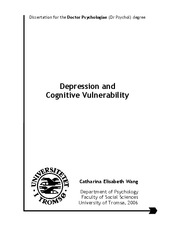Depression and cognitive vulnerability
Permanent link
https://hdl.handle.net/10037/660View/
Thesis introduction (PDF)
Wang, C. E., Brennen, T., & Holte, A. (2005). Mechanisms of recurrent depression: A cognitive battle model and some preliminary results. Clinical Psychology and Psychotherapy, 12, 427- 442. Reproduced by permission. (PDF)
Wang, C. E., Brennen, T., & Holte, A.: Automatic and effortful processing of self-statements in depression. Cognitive Behaviour Therapy, 35(2006), 117-124. Reproduced by permission. (PDF)
This is a post-print (final draft post review) of: Wang, C. E., Brennen, T., & Holte, A.: Decreased approach motivation in depression. Scandinavian Journal of Psychology, Volume 47, Issue 6: 505-511. doi: 10.1111/j.1467-9450.2006.00525.x. The definitive version is available at www.blackwell-synergy.com. Reproduced by permission. (PDF)
Date
2006-10-13Type
Doctoral thesisDoktorgradsavhandling
Author
Wang, Catharina ElisabethAbstract
The overall aim of the present study was to investigate how cognitive processing of emotionally valenced information may be a vulnerability factor to depression, and to develop a cognitive model of recurrent depression. Several more specific aims were formulated and investigated. To reach the aims of the study, an extensive theoretical review of the research literature on cognitive processes of depression was carried out. Also, we compared never depressed (ND; n = 46), previously depressed (PD; n = 42) and clinically depressed (CD; n = 61) individuals on several questionnaires and experimental tasks including dysphoric symptoms (BDI; Beck et al., 1979), dysfunctional attitudes (DAS; Weissman & Beck, 1978), preferences for positive and negative tape-recorded self-statements (Crowson & Cromwell, 1995), choice preference and reaction time to emotionally valenced words (DOAT; Gotlib, McLachlan, & Katz, 1988; Kakolewski, Crowson, Sewell, & Cromwell, 1999; McCabe & Gotlib, 1995), and free recall, recognition and fabrication of positive and negative self-statements (Wang & Holte, 1995). The main results of the study was: (1) the development of a Cognitive battle model to explain mechanisms involved in recurrent depression; (2) results which seem to indicate that dysfunctional attitudes, in mildly to moderately clinically depressed individuals, may have the potential to decrease the effortful processing of positive stimuli; and, (3) results which indicate that decreased approach motivation to positive stimuli may be a vulnerability factor to depression. Future research should be aimed to examine the relationship between parenting (e.g. insecure attachment; inadequate affect regulation), frontal lobe development (i.e., hemispheric asymmetry), cognitive vulnerability factors (e.g. uncertainty; rumination), and decreased approach motivation to positive stimuli.
Publisher
Universitetet i TromsøUniversity of Tromsø
Metadata
Show full item recordCollections
Copyright 2006 The Author(s)
The following license file are associated with this item:


 English
English norsk
norsk